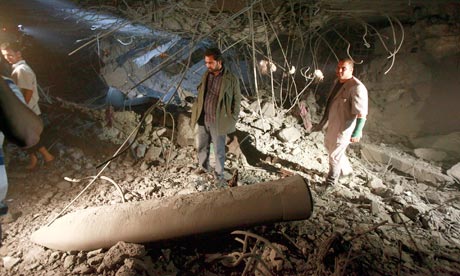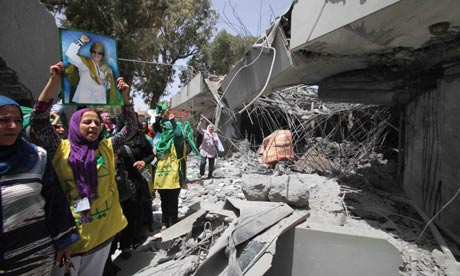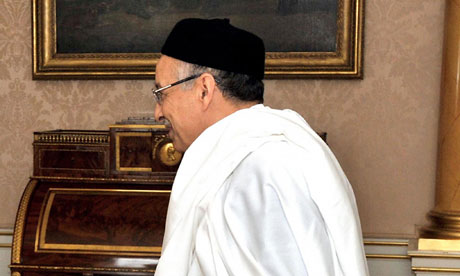Results 1 to 4 of 4
Thread Information
Users Browsing this Thread
There are currently 1 users browsing this thread. (0 members and 1 guests)
-
05-03-2011, 12:11 AM #1Senior Member


- Join Date
- May 2007
- Location
- South West Florida (Behind friendly lines but still in Occupied Territory)
- Posts
- 117,696
Targeted assassinations are a strategic mistake
Leading article: Targeted assassinations are a strategic mistake
Monday, 2 May 2011
The Nato air strike on the Bab al-Aziziya compound in Tripoli, which has apparently resulted in the deaths of civilians, looks like a grave mistake. Lieutenant General Charles Bouchard, the Canadian commander who authorised the attack, has claimed that the compound was a "known command-and-control building" for the Gaddafi regime. And the British Foreign Office minister Alistair Burt has pointed out that Libyan military command centres are often placed in civilian areas. But that is precisely why these aerial attacks are usually a bad idea. The odds of success are so low and the chances of killing innocent civilians so high.
The Libyan regime claims that Gaddafi's 29-year-old son, Saif al-Arab, and three of the leader's grandchildren were killed in the bombing. There has been no independent confirmation of that. But the episode has already turned into something of a propaganda victory for Gaddafi. Aerial bombing, particularly when it goes wrong, tends to rally populations in anger. We saw evidence of that taking effect in Tripoli yesterday, when United Nations buildings and foreign missions, including the British Embassy, were attacked by crowds.
Last week the US Defence Secretary, Robert Gates, and our own Defence Secretary, Liam Fox, told reporters in Washington that Nato was not directly targeting Gaddafi in these air strikes. Yet this bombing certainly resembles an attempted targeted assassination. It is unlikely to be a coincidence that Gaddafi himself is reported to have been in the compound at the time of the attack, although he is said to have been unharmed.
We have been here before. US air strikes on Tripoli in 1986, in response to suspected Libyan involvement in the bombing of a Berlin disco, killed Gaddafi's adopted daughter. Lessons do not appear to have been learnt. That episode enabled Gaddafi to shore up his position, presenting himself as a defender of Libya against foreign aggression.
Yesterday, David Cameron claimed justification for the strike under United Nations Resolution 1973, which allowed "all necessary measures" in order to protect civilians in Libya. There is, admittedly, room for debate about the resolution's meaning. But to find a justification for targeted assassinations in it is too much of a stretch.
The diplomatic strain is growing. International support for this operation is already threadbare. Russia and China are now opposed. Their antipathy will be hardened by this botched raid. Targeted assassinations even risk splitting Nato. Germany and Turkey are likely to be further alienated from the mission now.
But the real error is strategic. These strikes give the impression that the operation is, at heart, a confrontation between Gaddafi and the West. They leave the Libyan opposition looking helpless on the sidelines. That turns an internal revolt against a vicious dictator into another Western military adventure.
After six weeks of bombing, the situation in Libya looks like stalemate. Gaddafi's regime has proved resilient and his forces loyal. Advisers from France, Italy and Britain have been sent to assist the opposition and the US has dispatched unmanned drones. This was initially interpreted as an escalation in the foreign commitment. But some observers regard it more as a way of compensating for the fall in bombing since the US handed over the lead to Nato. In this context, the bombing of the compound begins to look like an act born of desperation; a desire to force a quick resolution before partition becomes inevitable.
Yet this is the Libyan opposition's fight, not Nato's. If the rebels are to achieve their objective of removing Gaddafi and uniting the country, they have to be seen to be leading the resistance. Nato does them, or indeed itself, no favours by trying to force the pace.
http://www.independent.co.uk/opinion/le ... 77721.htmlJoin our efforts to Secure America's Borders and End Illegal Immigration by Joining ALIPAC's E-Mail Alerts network (CLICK HERE)
-
05-03-2011, 12:14 AM #2Senior Member


- Join Date
- May 2007
- Location
- South West Florida (Behind friendly lines but still in Occupied Territory)
- Posts
- 117,696
Gaddafi's son's killing puts Nato in line of fire
Russia and Venezuela join Libyan regime in accusing Nato of attempting to assassinate Muammar Gaddafi
Harriet Sherwood
guardian.co.uk, Sunday 1 May 2011 11.51 BST

Libyan officials accuse Nato of attacking Saif al-Arab Gaddafi's house in hopes of killing Muammar Gaddafi. Photograph: Reuters
The Libyan regime's claims that Nato is attempting to assassinate Muammar Gaddafi have intensified following the apparent death of one of the leader's sons and three of his grandchildren in an air strike on Tripoli.
Gaddafi was at the one-storey house in a residential area of Tripoli when the missile struck late on Saturday, according to the government spokesman Moussa Ibrahim.
In a rare acknowledgement that security around Gaddafi may not be watertight, Ibrahim told reporters that intelligence about Gaddafi's whereabouts or plans must have been leaked to Nato.
The missile struck the house of Saif al-Arab, 29, the youngest and least well-known of Gaddafi's seven sons, just after 8pm on Saturday during a family gathering. The three grandchildren who were killed were under the age of 12, said Ibrahim.
David Cameron insisted that Nato was acting within the remit of the UN security council resolution, which authorised military actions to protect civilians.
But officials in Russia and Venezuela criticised the attack. "More and more facts indicate that the purpose of the anti-Libyan coalition is to physically destroy Gaddafi," said Konstantin Kosachev, a Russian legislator.
Nato said it had carried out a precision strike against a known command and control building. "All Nato's targets are military in nature and have been clearly linked to the Gaddafi regime's systematic attacks on the Libyan population and populated areas. We do not target individuals," said Lieutenant General Charles Bouchard, commander of Nato's Operation Unified Protector.
"I am aware of unconfirmed media reports that some of Gaddafi's family members may have been killed," he said. "We regret all loss of life, especially the innocent civilians being harmed as a result of the ongoing conflict. Nato is fulfilling its UN mandate to stop and prevent attacks against civilians with precision and care â unlike Gaddafi's forces, which are causing so much suffering."
The strike came hours after Gaddafi called for a ceasefire in the two-and-a-half-month civil war in a speech delivered live on Libyan state television. The Libyan government has repeatedly said it is ready for a political resolution to the conflict and a ceasefire, while continuing to launch military assaults on opposition forces, particularly in Misrata and the western mountains region.
"We renew our call for peace and negotiations," said Ibrahim following the air strike. "What we have now is the law of the jungle. How is this helping in the protection of civilians?"
Cameron declined to comment on the "unconfirmed report", but told the BBC: "The targeting policy of Nato and the alliance is absolutely clear. It is in line with UN resolution 1973 and it is about preventing a loss of civilian life by targeting Gaddafi's war-making machine. That is obviously tanks and guns and rocket launchers, but also command and control as well."
The Libyan regime will use the apparent death of close members of Gaddafi's family to reinforce its claims that Nato is acting illegitimately and that Libya is a victim of a western plot to topple Gaddafi.
UN resolution 1973 permits military action to protect Libyan civilians, which has been interpreted as covering Libyan military facilities, such as command and control centres, as well as military equipment in the field. It does not permit the specific targeting of individuals.
However some politicians in the west have urged Nato to target Gaddafi. "We must cut the head of the snake off," US senator Lindsey Graham said a week ago after the bombing of a building within Gaddafi's Tripoli compound.
Journalists taken to the scene of Saif al-Arab's house in a smart neighbourhood of the capital reported seeing an unexploded missile lying amid shattered concrete and twisted metal. A large crater exposed what appeared to be an underground bunker.
In his 80-minute speech on Libyan state TV in the early hours of Saturday morning, Gaddafi said: "I'm not leaving my country. No one can force me to leave my country, and no one can tell me not to fight for my country."
He described Nato's military intervention in Libya as "a massacre".
http://www.guardian.co.uk/world/2011/ma ... on-killingJoin our efforts to Secure America's Borders and End Illegal Immigration by Joining ALIPAC's E-Mail Alerts network (CLICK HERE)
-
05-03-2011, 12:16 AM #3Senior Member


- Join Date
- May 2007
- Location
- South West Florida (Behind friendly lines but still in Occupied Territory)
- Posts
- 117,696
Libyans set British embassy alight after Nato attacks
UK expels ambassador after Tripoli crowds trash embassy in response to air strike that killed members of Gaddafi's family
Julian Borger, Harriet Sherwood and Ian Traynor in Brussels
guardian.co.uk, Sunday 1 May 2011 22.54 BST

Libyans gather outside Muammar Gaddafi's house in Tripoli after it was hit by a Nato air strike. Photograph: Str/EPA
The British embassy in Tripoli was set on fire and other western missions were ransacked by angry Libyan crowds yesterday in retaliation for a Nato air strike that killed members of Muammar Gaddafi's family.
Britain responded to the burning of its chancellery and official residence by expelling Libya's ambassador to London, Omar Jelban, who was given 24 hours to leave the country.
Italy also reported that its embassy had been vandalised, and attacks were reported on the French and US embassies and on United Nations buildings.
The UN announced it was withdrawing its last international staff from Tripoli, as security degenerated in the capital following Saturday night's attack on a Gaddafi family home, which killed one of his sons and three young grandchildren.
Gaddafi himself was in the building at the time but escaped unharmed.
It was the second time in three days that Nato air attacks have come close to the Libyan leader, drawing accusations from Russia and Venezuela that the alliance was trying to assassinate Gaddafi. Nato officials denied that tactics had changed, insisting that they were targeting Libya's military command and control.
"We do not target individuals," said Lieutenant General Charles Bouchard, commander of Nato's Operation Unified Protector, adding that he regretted any loss of life.
David Cameron said that to uphold the UN resolution on protecting Libyan civilians Nato was entitled to target not just "tanks and guns and rocket launchers, but also command and control as well".
Saif al-Arab Gaddafi, one of Gaddafi's less prominent sons, was killed in the attack, and three of his nieces and nephews â the leader's grandchildren â who were all thought to be pre-teens, also died.
Moussa Ibrahim, a government spokesman, called it a "direct operation to assassinate" the Libyan leader.
He added tellingly that intelligence appeared to have been leaked on Gaddafi's whereabouts, suggesting a sudden vulnerability. "They knew about him being there, or expected him for some reason."
Elsewhere, there were signs from the besieged city of Misrata that both sides were seeking to use the dramatic events of the weekend to seize the initiative.
http://www.guardian.co.uk/world/2011/ma ... to-attacksJoin our efforts to Secure America's Borders and End Illegal Immigration by Joining ALIPAC's E-Mail Alerts network (CLICK HERE)
-
05-03-2011, 12:19 AM #4Senior Member


- Join Date
- May 2007
- Location
- South West Florida (Behind friendly lines but still in Occupied Territory)
- Posts
- 117,696
Britain expels Libya ambassador
UK orders expulsion of Omar Jelban in retaliation for British embassy attack by pro-Gaddafi crowd in Tripoli
Julian Borger and Maev Kennedy
guardian.co.uk, Sunday 1 May 2011 15.56 BST

Omar Jelban has been ordered to leave the country. Photograph: John Stillwell/PA
Britain has ordered the expulsion of the Libyan ambassador to London, Omar Jelban, in retaliation for an attack on the British embassy by a pro-Gaddafi crowd in Tripoli.
Jelban has been given 24 hours to leave the country.
"I condemn the attacks on the British embassy premises in Tripoli as well as the diplomatic missions of other countries," said the foreign secretary, William Hague. "The Vienna convention requires the Gaddafi regime to protect diplomatic missions in Tripoli. By failing to do so that regime has once again breached its international responsibilities and obligations. I take the failure to protect such premises very seriously indeed."
The statement went on: "As a result, I have taken the decision to expel the Libyan ambassador. He is persona non grata pursuant to article 9 of the Vienna convention on diplomatic relations and has 24 hours to leave the country."
According to Foreign Office sources, the building housing both the British embassy residence and its chancellery was burned down by a mob early on Sunday. The attacks on the British and other western embassies followed the Nato missile strike on one of Muammar Gaddafi's villas, which the Libyan government says killed his youngest son, Saif al-Arab.
The Gaddafi regime appears to have mounted a symbolic attack on empty diplomatic residences and embassies in Tripoli. There are no British diplomats in the Libyan capital.
Other foreign residences were also targeted, as the UN announced it was taking all its remaining international staff out of Tripoli.
The Italian foreign ministry said its embassy and several others in Tripoli were damaged by vandals and accused the Gaddafi regime of failing to take measures to protect foreign missions.
The ministry issued a statement on Sunday following reports from Tripoli that a fire had broken out at the Italian embassy.
A witness told Reuters news agency: "I am across the road from the Italian embassy. I can see smoke still coming out of the embassy. It was on fire. There is no one there now, just a security car to stop other people coming."
Some reports suggest that the buildings were attacked by mobs.
Foreign correspondents in Tripoli have been unable to visit the sites to confirm the reports.
Most of the diplomats pulled out of Tripoli when the Nato no-fly zone was imposed. The UK is maintaining a diplomatic presence in Benghazi, the rebel-held city in the east of the country.
http://www.guardian.co.uk/world/2011/ma ... ambassadorJoin our efforts to Secure America's Borders and End Illegal Immigration by Joining ALIPAC's E-Mail Alerts network (CLICK HERE)


 LinkBack URL
LinkBack URL About LinkBacks
About LinkBacks




 Reply With Quote
Reply With Quote

72 Hours Till Deadline: Durbin moves on Amnesty
04-28-2024, 02:18 PM in illegal immigration Announcements